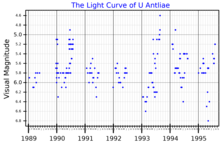| Observation data Epoch J2000 Equinox J2000 | |
|---|---|
| Constellation | Antlia |
| Right ascension | 10h 35m 12.852s[1] |
| Declination | −39° 33′ 45.32″[1] |
| Apparent magnitude (V) | 5.27 - 6.04[2] |
| Characteristics | |
| Evolutionary stage | AGB |
| Spectral type | C-N3[3] (C5,3[4]) |
| U−B color index | 7.10[5] |
| B−V color index | 2.84[5] |
| Variable type | LB[6] |
| Astrometry | |
| Radial velocity (Rv) | 41.00[7] km/s |
| Proper motion (μ) | RA: −31.372±0.228[8] mas/yr Dec.: 2.371±0.267[8] mas/yr |
| Parallax (π) | 3.5717 ± 0.2043 mas[8] |
| Distance | 910 ± 50 ly (280 ± 20 pc) |
| Absolute magnitude (MV) | −1.87[9] |
| Details | |
| Radius | 422[10][a] R☉ |
| Luminosity | 4,500[10] L☉ |
| Temperature | 2,300[10] K |
| Other designations | |
| Database references | |
| SIMBAD | data |

U Antliae (U Ant) is a variable star in the constellation Antlia. It is a carbon star surrounded by two thin shells of dust.
U Antliae is an extremely red C-type carbon star. These cool stars on the asymptotic giant branch are further reddened by strong mass loss and dust that forms around the star. U Antliae is calculated to have an effective surface temperature of 2,800 K, although the light that reaches us has an appearance more like that from a black body with a temperature of 2,300 K surrounded by dust at a temperature of 72 K.[11] It emits most of its radiation in the infrared and although it is only about 500 times brighter than the sun at visual wavelengths,[9] its bolometric luminosity is 8,000 times higher than the Sun's.[11]

U Antliae is an irregular variable star with an apparent magnitude that varies between 5.27 and 6.04. Approximately 900 light years from Earth, it is surrounded by two shells of dust, thought to have been ejected 14,000 and 10,000 years ago.[13] The exact origin and structure of the shells is uncertain, possibly due to enhanced mass loss during thermal pulses, possibly due to interaction of the stellar wind with interstellar material.[11]
- ^ a b Cite error: The named reference
van Leeuwen2007was invoked but never defined (see the help page). - ^ Cite error: The named reference
AAVSOUwas invoked but never defined (see the help page). - ^ Cite error: The named reference
demellowas invoked but never defined (see the help page). - ^ Cite error: The named reference
yamashitawas invoked but never defined (see the help page). - ^ a b Cite error: The named reference
ducatiwas invoked but never defined (see the help page). - ^ Cite error: The named reference
gcvswas invoked but never defined (see the help page). - ^ Cite error: The named reference
rvwas invoked but never defined (see the help page). - ^ a b c Brown, A. G. A.; et al. (Gaia collaboration) (August 2018). "Gaia Data Release 2: Summary of the contents and survey properties". Astronomy & Astrophysics. 616. A1. arXiv:1804.09365. Bibcode:2018A&A...616A...1G. doi:10.1051/0004-6361/201833051. Gaia DR2 record for this source at VizieR.
- ^ a b Cite error: The named reference
alksniswas invoked but never defined (see the help page). - ^ a b c Răstău, V.; Mečina, M.; Kerschbaum, F.; Olofsson, H.; Maercker, M.; Drechsler, M.; Strottner, X.; Mulato, L. (2023-12-01), "Extended far-UV emission surrounding asymptotic giant branch stars as seen by GALEX", Astronomy & Astrophysics, 680: A12, arXiv:2310.09056, doi:10.1051/0004-6361/202346120, ISSN 0004-6361
- ^ a b c Cite error: The named reference
kerschbaumwas invoked but never defined (see the help page). - ^ Cite error: The named reference
aavsowas invoked but never defined (see the help page). - ^ Cite error: The named reference
Izumiurawas invoked but never defined (see the help page).
Cite error: There are <ref group=lower-alpha> tags or {{efn}} templates on this page, but the references will not show without a {{reflist|group=lower-alpha}} template or {{notelist}} template (see the help page).
